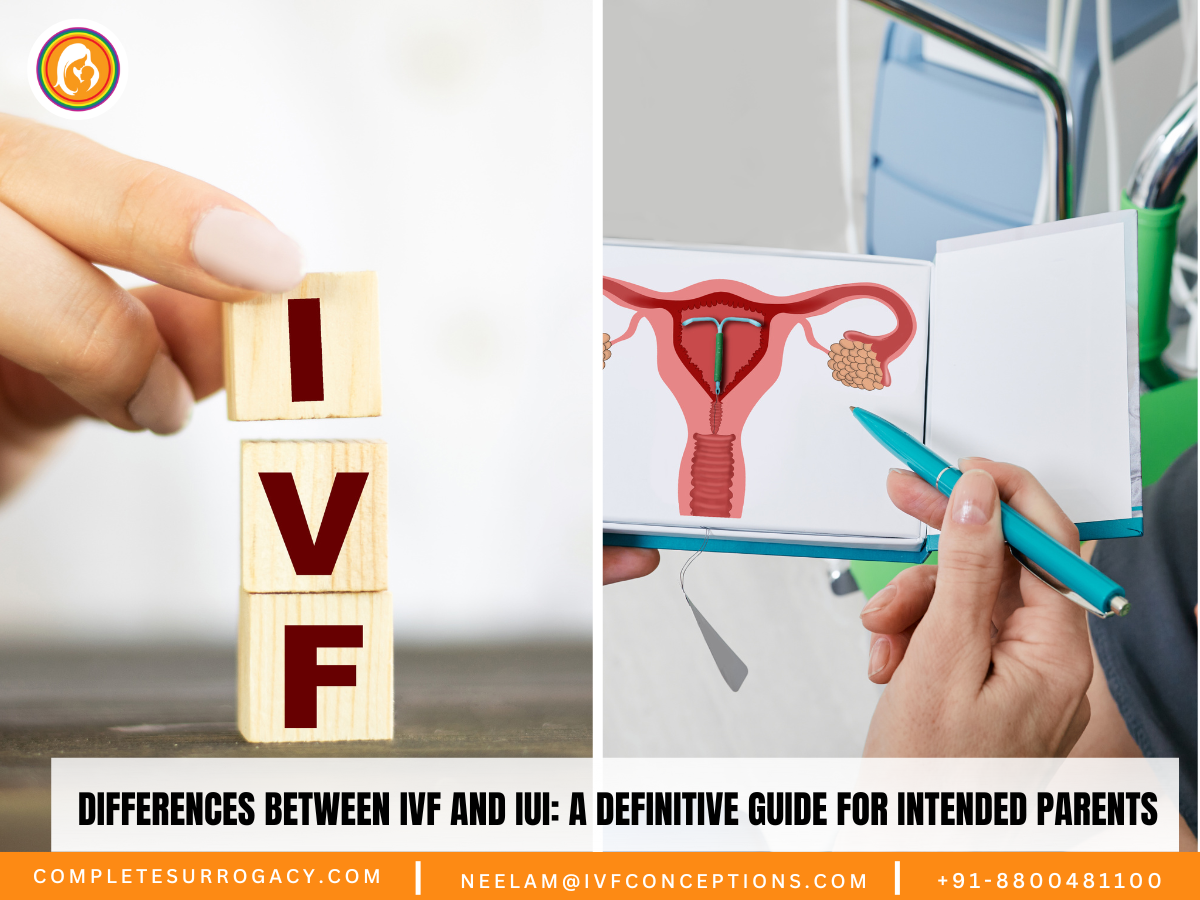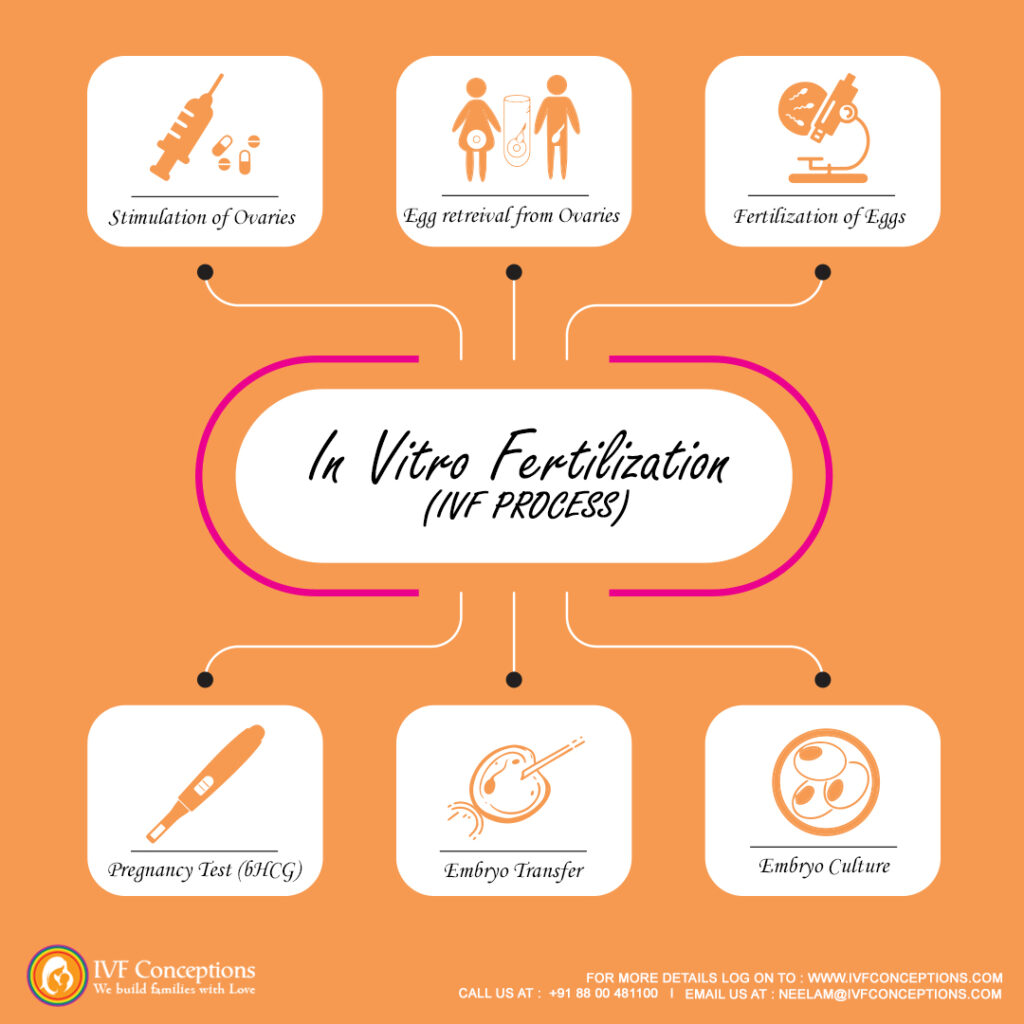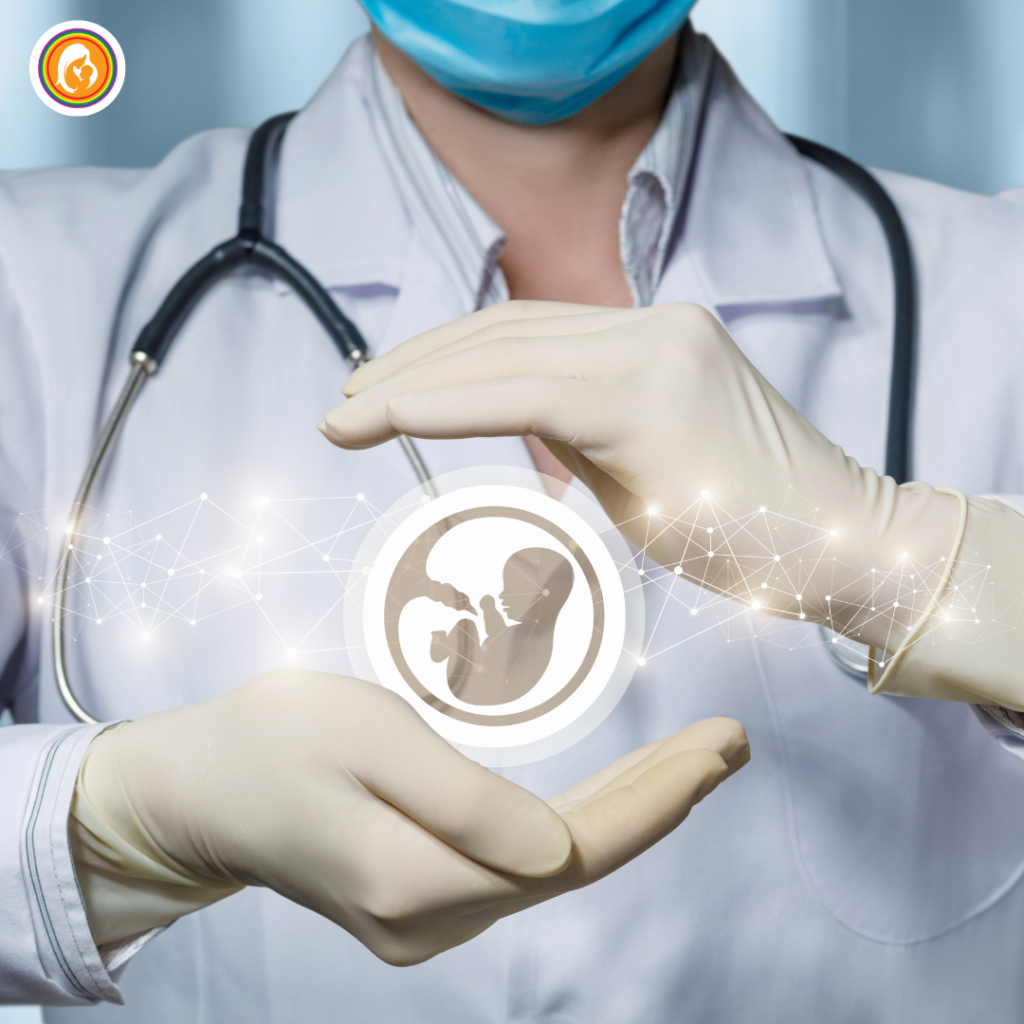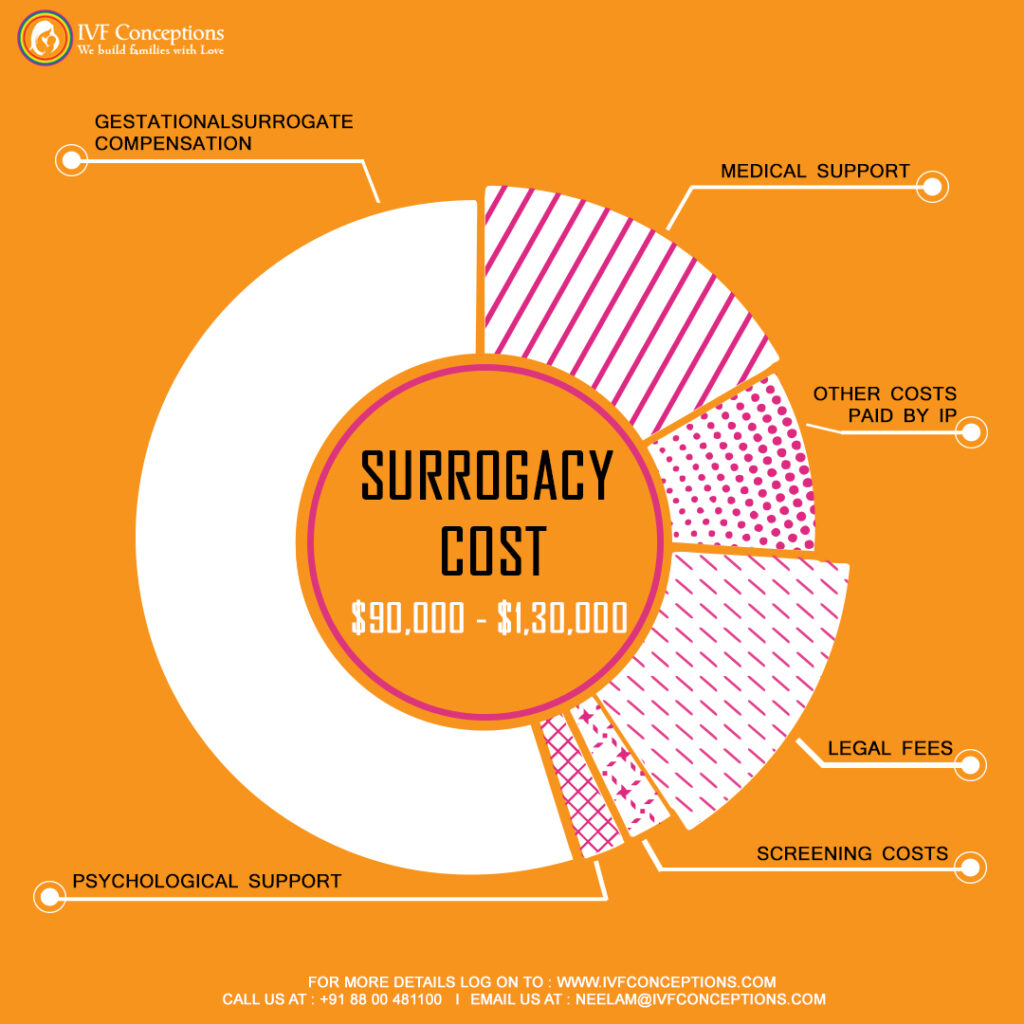Differences between IVF and IUI: A Definitive Guide for Intended Parents

The main difference between IVF and IUI is that IVF (In Vitro Fertilization) is more invasive and costly assisted fertility treatment, while IUI (Intrauterine Insemination) is generally more affordable and less invasive. IVF involves the fertilization of eggs outside the body and the implantation of the embryos, making it more complex. In contrast, IUI involves placing sperm directly into the uterus during ovulation, making it a simpler and less expensive procedure.
Understanding the differences between IVF and IUI can help individuals and couples decide which treatment aligns best with their medical needs, budget, and personal preferences.
- Book an online appointment: Get a free online consultation.
- Call\W:+91-8800481100 Email:[email protected]
For those considering affordable fertility treatments or wondering about the success rates of IUI versus IVF, it’s important to weigh both the costs and the benefits before making a decision.
Infertility affects millions of couples worldwide, with approximately 15% of couples experiencing difficulties conceiving. For those struggling with infertility, assisted reproductive technologies (ART) offer hope. Two of the most common fertility treatments are Intrauterine Insemination (IUI) and In Vitro Fertilization (IVF). This comprehensive guide will explore the differences between these two procedures, helping intended parents make informed decisions about their fertility journey.
More Resources to Read:
Surrogacy Guide for Surrogate Mothers
Surrogacy Guide for Intended Parents
How does the surrogacy process work
Understanding Infertility
Before diving into the specifics of IUI and IVF, it’s crucial to understand infertility. Infertility is defined as the inability to conceive after one year of regular, unprotected sexual intercourse for couples under 35, or after six months for women over 35. Common causes of infertility include:
- Age-related factors
- Hormonal imbalances
- Ovulation disorders
- Tubal blockages
- Male factor infertility (low sperm count or motility)
- Endometriosis
- Unexplained infertility
What is IUI?
Intrauterine Insemination (IUI) is a fertility treatment where sperm is directly inserted into the uterus during ovulation. This procedure aims to increase the number of sperm reaching the fallopian tubes, thereby improving the chances of fertilization.
The IUI Process
- Ovulation monitoring: The woman’s ovulation cycle is tracked using ultrasound and/or ovulation predictor kits.
- Sperm preparation: A semen sample is collected and processed to select the healthiest sperm.
- Insemination: The prepared sperm is inserted directly into the uterus using a thin catheter.
- Post-procedure care: The woman may be prescribed progesterone supplements to support early pregnancy.

When is IUI Recommended?
IUI may be suitable for couples experiencing:
- Mild male factor infertility
- Cervical factor infertility
- Unexplained infertility
- Same-sex female couples using donor sperm
- Single women using donor sperm
What is IVF?
In Vitro Fertilization (IVF) is a more complex fertility treatment that involves fertilizing eggs with sperm outside the body in a laboratory setting. The resulting embryos are then transferred back into the uterus.
The IVF Process
- Ovarian stimulation: Fertility medications are used to stimulate the ovaries to produce multiple eggs.
- Egg retrieval: Mature eggs are collected from the ovaries using a minor surgical procedure.
- Sperm collection: A semen sample is collected and processed.
- Fertilization: Eggs and sperm are combined in the laboratory for fertilization.
- Embryo culture: Fertilized eggs are monitored for several days as they develop into embryos.
- Embryo transfer: One or more embryos are transferred into the uterus.
- Luteal phase support: Hormonal supplements are given to support early pregnancy.

When is IVF Recommended?
IVF may be recommended for couples facing:
- Blocked or damaged fallopian tubes
- Severe male factor infertility
- Advanced maternal age
- Genetic disorders requiring preimplantation genetic testing
- Recurrent pregnancy loss
- Unexplained infertility after failed IUI attempts
Key Differences Between IUI and IVF
To help intended parents understand the distinctions between these two fertility treatments, let’s compare IUI and IVF across several important factors:
| Factor | IUI | IVF |
| Complexity | Less complex, minimally invasive | More complex, involves multiple steps |
| Success Rates | Lower (5-20% per cycle) | Higher (40-50% for women under 35) |
| Cost | Less expensive ($300-$1,000 per cycle) | More expensive ($12,000-$15,000 per cycle) |
| Medication | Mild or no ovarian stimulation | Strong ovarian stimulation |
| Time Commitment | Less time-intensive | More time-intensive |
| Multiple Pregnancy Risk | Higher with ovarian stimulation | Can be controlled with single embryo transfer |
| Genetic Testing | Not possible | Possible with preimplantation genetic testing |
Success Rates: IUI vs. IVF
Success rates for both IUI and IVF vary depending on factors such as age, underlying fertility issues, and overall health. Here’s a general overview of success rates:
IUI Success Rates
- Women under 35: 10-20% per cycle
- Women 35-40: 5-15% per cycle
- Women over 40: 2-5% per cycle
IVF Success Rates
- Women under 35: 40-50% per cycle
- Women 35-37: 30-40% per cycle
- Women 38-40: 20-30% per cycle
- Women over 40: 10-20% per cycle
It’s important to note that these are average success rates, and individual outcomes may vary. Consulting with a fertility specialist can provide more personalized success rate estimates based on your specific situation.
Choosing Between IUI and IVF
Deciding between IUI and IVF is a personal decision that should be made in consultation with a fertility specialist. Several factors to consider include:
- Age: Women over 35 may benefit from moving directly to IVF due to higher success rates.
- Underlying fertility issues: Certain conditions may be better addressed with IVF.
- Previous fertility treatments: If multiple IUI cycles have failed, IVF may be recommended.
- Financial considerations: IUI is less expensive per cycle, but multiple cycles may be needed.
- Time constraints: IVF may offer faster results for some couples.
- Emotional and physical readiness: IVF is more demanding and may require greater emotional and physical preparation.
Preparing for IUI or IVF Treatment
Regardless of which treatment you choose, there are steps you can take to optimize your chances of success:
- Maintain a healthy lifestyle: Eat a balanced diet, exercise regularly, and avoid alcohol and tobacco.
- Manage stress: Practice stress-reduction techniques such as meditation or yoga.
- Take prenatal vitamins: Start taking folic acid and other recommended supplements.
- Optimize male fertility: Men should avoid hot tubs, limit alcohol intake, and quit smoking.
- Follow medical advice: Adhere to all medication protocols and attend all scheduled appointments.

Risks and Side Effects of IUI and IVF
Both IUI and IVF carry some risks and potential side effects:
IUI Risks
- Mild cramping
- Spotting
- Multiple pregnancies (with ovarian stimulation)
- Rare risk of infection
IVF Risks
- Ovarian hyperstimulation syndrome (OHSS)
- Multiple pregnancies
- Ectopic pregnancy
- Egg retrieval complications
- Emotional stress
Financial Considerations
The cost of fertility treatments can be significant. Here’s a breakdown of potential expenses:
IUI Costs
- Basic IUI: $300-$1,000 per cycle
- Medications (if used): $50-$500 per cycle
- Monitoring: $200-$500 per cycle
IVF Costs
- Basic IVF cycle: $12,000-$15,000
- Medications: $3,000-$5,000
- Additional procedures (ICSI, PGT): $1,000-$5,000 each
- Frozen embryo transfer: $3,000-$5,000
It’s important to check with your insurance provider, as coverage for fertility treatments varies widely. Some employers also offer fertility benefits as part of their health plans.

Emotional Support During Fertility Treatment
Undergoing fertility treatment can be emotionally challenging. Consider the following support options:
- Join a support group for individuals or couples experiencing infertility.
- Seek counseling from a therapist specializing in fertility issues.
- Communicate openly with your partner about your feelings and concerns.
- Practice self-care and stress-reduction techniques.
- Connect with online communities for support and information sharing.
Additional guide for intended parents:
Best surrogacy agency in India
Best surrogacy agency in Mexico
Best surrogacy agency in Colombia
Best surrogacy agency in Argentina
Best surrogacy agency in Georgia
Conclusion
Choosing between IUI and IVF is a significant decision for intended parents facing fertility challenges. By understanding the differences, success rates, and factors to consider, you can make an informed choice that aligns with your personal circumstances and goals. Remember that every fertility journey is unique, and what works for one couple may not be the best option for another.
If you’re considering fertility treatment, consult with a reputable fertility specialist to discuss your options and develop a personalized treatment plan. With advancements in reproductive technologies and expert guidance, many couples can overcome infertility and achieve their dream of parenthood.
For more information on fertility treatments, including IVF, egg donation, and surrogacy services, visit our website at IVF Conceptions. We offer free, legally secure, and affordable surrogacy consulting services to help guide you through your fertility journey.
If you’d like to learn more about IVF, Egg Donation, or surrogacy services globally, check out the rest of our website at Complete Surrogacy Agency. We offer legally secure and affordable surrogacy consulting services for FREE.
Complete Surrogacy: Your Trusted Partner in International Surrogacy
At Complete Surrogacy, we have over 15 years of experience in international surrogacy, guiding 4,000+ intended parents worldwide. We provide safe, ethical, and affordable surrogacy solutions for single parents, LGBTQ+ couples, and heterosexual couples.
As members of EFS and ESHRE, we adhere to the highest ethical and professional standards. Our expert team is committed to providing accurate, compassionate, and transparent guidance, ensuring a legally secure and smooth journey to parenthood.
Let us help you build your family with trust, care, and integrity.
Get in touch for one FREE Surrogacy Consultancy!

FAQs About IUI and IVF
What is the main difference between IUI and IVF?
IUI involves placing sperm directly into the uterus during ovulation, while IVF involves fertilizing eggs outside the body and then transferring the resulting embryos into the uterus.
Which treatment has a higher success rate, IUI or IVF?
Generally, IVF has a higher success rate than IUI. However, success rates vary depending on individual factors such as age and specific fertility issues.
How much do IUI and IVF typically cost?
IUI usually costs between $300-$1,000 per cycle, while a single IVF cycle can cost $12,000-$15,000 or more.
Are IUI and IVF covered by insurance?
Coverage varies widely among insurance providers and plans. Check with your insurance company for specific details about your coverage.
How many IUI attempts should I try before moving to IVF?
Most doctors recommend trying 3-6 IUI cycles before considering IVF, especially for women under 35. However, this can vary based on individual circumstances.
What are the risks associated with IUI and IVF?
Both procedures carry a risk of multiple pregnancies. IVF has additional risks such as ovarian hyperstimulation syndrome (OHSS) and complications from egg retrieval.
How long does each treatment cycle take?
An IUI cycle typically takes about two weeks from the start of ovulation to the insemination procedure. An IVF cycle usually takes about 4-6 weeks from the start of ovarian stimulation to the embryo transfer.
Can I choose the gender of my baby with IUI or IVF?
Gender selection is not possible with IUI. With IVF, gender selection is possible through preimplantation genetic testing (PGT), but it’s not legal in all countries and has ethical considerations.
What’s the age limit for IUI and IVF?
There’s no strict upper age limit, but success rates decline significantly after age 35 for IUI and age 40 for IVF. Many clinics have their own age guidelines.
Can same-sex couples use IUI or IVF?
Yes, both IUI and IVF can be options for same-sex couples. Female couples often use IUI with donor sperm, while male couples typically use IVF with an egg donor and gestational carrier.
How do I prepare for IUI or IVF treatment?
Preparation may include lifestyle changes (like quitting smoking and maintaining a healthy weight), taking prenatal vitamins, and following your doctor’s specific instructions.
What’s the difference in medication used for IUI versus IVF?
IUI may use mild ovarian stimulation medications or none at all. IVF typically requires stronger medications to stimulate the ovaries to produce multiple eggs.
Can I exercise during IUI or IVF treatment?
Light exercise is usually okay, but you should avoid strenuous activities. Always consult with your doctor about exercise during treatment.
How soon after IUI or IVF can I take a pregnancy test?
For IUI, you can typically test 14 days after the procedure. For IVF, your doctor will usually schedule a blood test about 9-14 days after the embryo transfer.
What happens if IVF is unsuccessful? Can I try again immediately?
If an IVF cycle is unsuccessful, you’ll usually need to wait at least one full menstrual cycle before trying again. Your doctor will advise on the best timing for your situation.

Author Bio: Neelam Chhagani is an International Surrogacy Expert with 15 years of experience in the fertility and surrogacy domain. As the founder of IVF Conceptions and Complete Surrogacy, she has guided over 4,000 intended parents worldwide on their surrogacy journey to parenthood. Recognized as a trusted authority, she specializes in holistic infertility solutions and third-party reproduction consulting.
Holding an MA in Counselling Psychology and a PGD in Mental Health, Neelam is a proud member of the European Fertility Society (EFS) and the European Society of Human Reproduction and Embryology (ESHRE). She is also a leading surrogacy blogger, providing valuable insights into ethical and practical surrogacy solutions.
Since 2010, committed to supporting ALL family types, Neelam has been passionate about helping intended parents grow their families with compassion, integrity, and a focus on secure and affordable surrogacy options Globally.
Learn more about Neelam:
https://www.ivfconceptions.com/neelam-chhagani-surrogacy-consultant/
https://www.linkedin.com/in/neelam-chhagani-92892229/
https://www.quora.com/profile/Neelam-Chhagani















I was introduced to Neelam by a friend who worked with Neelam for surrogacy. Neelam is absolutely wonderful. I am a single male and the journey to fatherhood is not that easy. Neelam connected me to a program ideal for my circumstances. She was with me throughout the pregnancy providing advice and guidance along the way. I am so grateful I found her and am thrilled today that I have a beautiful daughter. I highly recommend Neelam to anyone who is on a journey to become a parent. Having a child has changed my world for the better. I wish others success with their own journey and recommend you connect with Neelam to find a path that is best for you.
SA (USA)